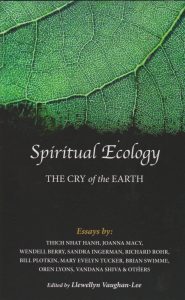
Golden Sufi Centre, 2013, pbk, 296 pp
ISBN: 978-1890350451
Reviewed by Marian Van Eyk McCain
___________________________________________________________________
As the blurb points out, our present ecological crisis—accelerating climate change, species depletion, pollution and acidification of the oceans — is the greatest man-made disaster this planet has ever faced. A central but rarely addressed aspect of this crisis is our forgetfulness of the sacred nature of creation and how this affects our relationship to the environment. There is a pressing need to articulate a spiritual response to this ecological crisis if we are to help bring the world as a living whole back into balance.
In this book, under the editorship of Sufi teacher and author Llewellyn Vaughan-Lee, twenty powerful voices take it in turns, each in his or her own way, to articulate a response to the crisis. Many of these voices are of people we know well from their writings, speeches, teachings and actions over the years. They are: Oren Lyons, Thomas Berry, Thich Nhat Hanh, Chief Tamale Bwoya, John Stanley, David Loy, Joanna Macy, Sandra Ingerman, Richard Rohr, Wendell Berry, Sister Miriam MacGillis, Satish Kumar, Vandana Shiva, Pir Zia Inayat-Kahn, Winona LaDuke, Susan Murphy, Geneen Marie Haugen, Bill Plotkin, Jules Cashford, Mary Evelyn Tucker and Brian Swimme.
Varied as they are in their origins, their personalities and their work, all of these people share a vision of how our world could be if we could only recover from what Thomas Berry referred to as our ‘spiritual autism,’ come to the full realization of what it means to be a cell in the body of a living planet and live our lives out of that knowing.
My frustration with anthologies like this is that because (a) it is hard to write about the response to a crisis without spending a page or two describing the crisis and (b) there are so many contributors, the book ends up spending roughly seven percent of its total space on reiterating the evils and perils and problems we are currently facing. In other words, quite a few pages devoted to ‘ain’t it awful?’
Secondly, it is quite a challenge to articulate a spiritual response to this ecological crisis without producing yet another book sprinkled with what an Australian ‘Strine’ speaker might call ‘aorta’ statements (people ought to love the Earth… politicians ought to get together to reduce carbon emissions…and so on). All of which are true but basically useless because people don’t and politicians don’t.
All the contributions were well-written and all were inspirational to some degree, but the ones I enjoyed best were those that managed to avoid the two aforementioned traps completely and offer something truly new and something grounded in actual practice. Notable among these were Haugen’s writing about experiences of grounding and ‘rewilding,’ Macy’s essay on ‘The Greening of the Self’, Cashford’s re-evocation of ancient Gaia, Bill Plotkin’s re-visioned developmental guidelines for ecopsychological growth and Sandra Ingerman’s shamanic-based work on transmutation.
Overall, I agree with author Barry Lopez, who supplied an endorsement, that despite a few limitations, ‘Spiritual Ecology’ is a superb collection of thoughtful pieces by people who have gone deep to understand our relations with the Earth. And I think it definitely deserves a place on our GreenSpirit bookshelves.

